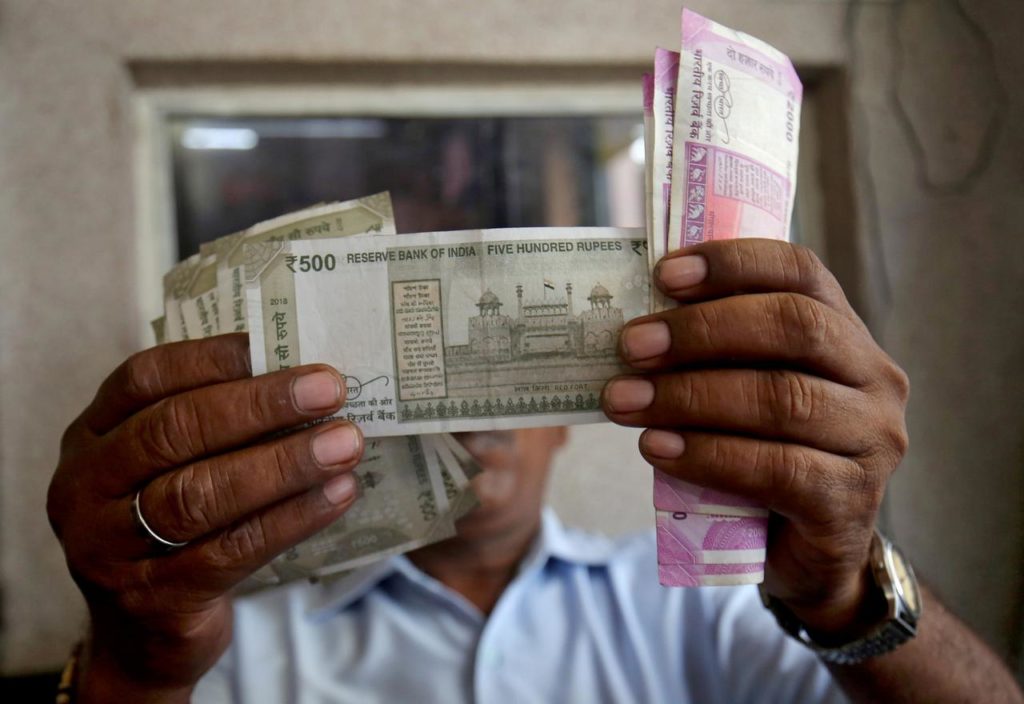Love Of Cash Hinders India’s Move To Digital Economy
Nov 14, 2019 | Pratirodh Bureau
FILE PHOTO: A cashier checks Indian rupee notes inside a room at a fuel station in Ahmedabad
India’s dependency on cash may slow the country’s transition to digital payments despite large numbers of internet and mobile phone users.
For many citizens living in rural areas, cash is still the bedrock of daily existence because of a lack of facilities.
Sudhir Shinde, a farmer from Satara district in India’s western state of Maharashtra says he withdraws more money from his bank than required as the money vending machine in his village has not been operational for months.
“If I need money urgently, I must make a 32 kilometre (20 mile) trip to Satara town, which is not always possible,” said the 37-year-old sugarcane farmer Shinde, while buying fertilisers for his winter-sown crops.
“I always keep money in hand assuming family emergencies like hospitalization or any other such urgent requirements”.
Indian Prime Minister Narendra Modi backed a shock ruling in November 2016 to outlaw 86% of cash in circulation to target undeclared “black money” and fight corruption.
The demonetization got rid of old 500 and 1,000 rupee banknotes and Modi said that would boost the country’s digital economy, unearth unaccounted wealth and reduce the use of cash.
But 99.3% of the junked currency is back in the banking system, suggesting that only a miniscule portion was unaccounted illicit money or fake currency notes, and India’s addiction to cash is now, perhaps stronger than ever.
CASH WANTED
One of the key objectives of the note ban was to discourage the use of cash, but India continues to see a surge in currency in circulation even as economic growth has slowed to a six-year low.
Central bank data shows that since the controversial demonetization gambit, currency in circulation has grown, rising 17% to 21.1 trillion rupees ($295.7 billion) as of the end of March 2019.
The ratio of currency in circulation to GDP has risen to 11.23% as of March 2019, up from 8.69% at the end of March 2017.
To be sure, digital transactions have grown, rising 19.5% in value in 2018/19 and 22.2% in 2017/18, the Reserve Bank of India said in a report.
On whether India’s efforts to move to electronic payments have been slow, the central bank noted what it said in a statement last week.
To promote digital payment, the RBI has established “state of the art payment systems that are efficient, convenient, safe, secure and affordable” that has resulted in a rapid growth in retail digital payment systems.
Meanwhile, it will promote the use of e-payments for parking, fuel and toll collection, and has ordered banks not to charge bank customers for online transactions in the National Electronic Funds Transfer (NEFT) system from January 2020.
Anecdotal evidence, however, suggests people in Asia’s third-largest economy prefer cash for various reasons, including to avoid paying higher taxes after a national sales tax was implemented in mid-2017 and higher charges from retailers.
Smaller stores who don’t enjoy high volume sales often charge customers extra, to make up for what they must pay the service partners for electronic transactions.
Higher operating costs have also led to a slowdown in opening of new ATMs, which has led to cash hoarding.
India has the fewest ATMs per 100,000 people among BRICS nations, according to the International Monetary Fund. Banks hobbled with bad debts have struggled to absorb the cost of software and equipment upgrades mandated by the central bank last year, along with higher land costs in the cities.
Other factors such as the country’s rural-urban divide have also affected the migration to electronic payments.
“Digital economy has certainly gained momentum in metros, cities and to some extent in semi-urban belts. But it has not spread to rural belts or the informal sector where financial illiteracy is the issue,” said Rupa Rege Nitsure, chief economist at L&T Financial Holdings.
“It is difficult to predict when the shift would happen because general education and financial education are different things,” she added.
India is the world’s second-largest internet and mobile phone market by number of users, trailing only China. However, a survey conducted by social media firm LocalCircles shows a large number of people still prefer cash transactions over digital with an average of 27% people having paid for 50-100% of purchases over the last 12 months without a receipt.
With the start of the goods and services tax (GST), tax on goods such as gold and silver was raised, prompting buyers and sellers to opt for cash transactions.
“Many small jewelers sell gold without receipts and consumers are also happy as they avoid paying 3% GST, which is a huge amount in the case of gold,” said a Mumbai-based jeweler, who declined to be identified.
India raised import taxes on gold to 12.5% in July from 10%, which increased margins for gold smugglers. Many small jewelers sell smuggled gold in cash at a discount and pocket the profits, the jeweler said.
